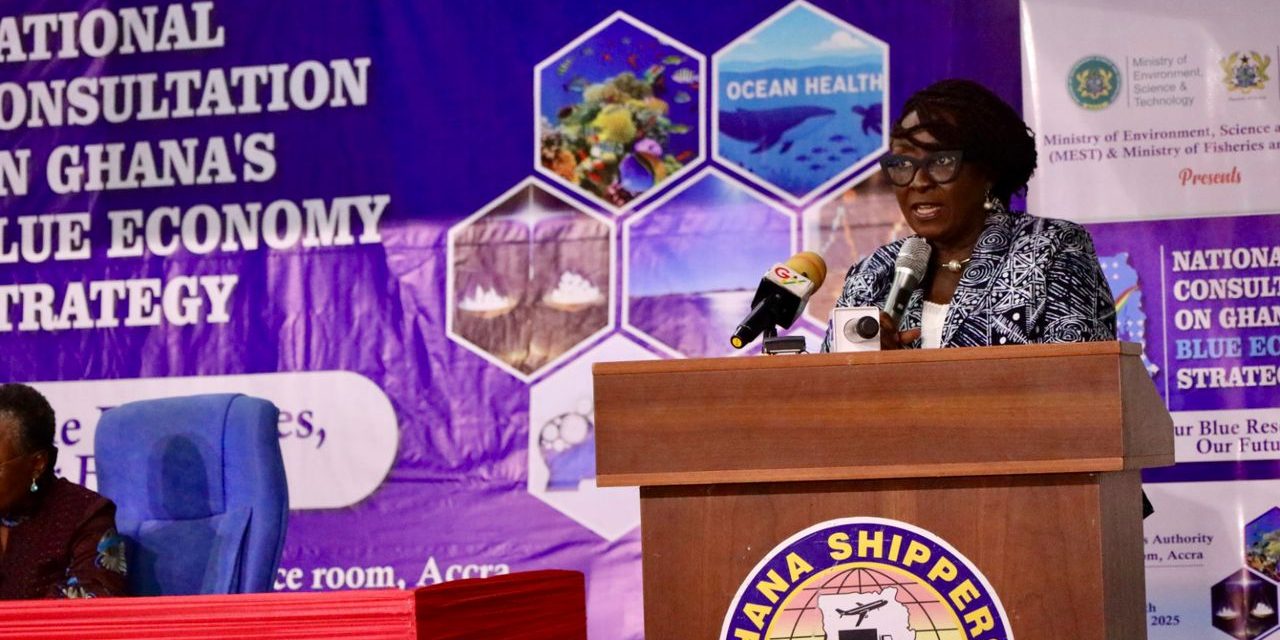Ghana’s marine and coastal resources are central to the country’s socio-economic wellbeing and must be protected and developed sustainably, Hon. Abla Dzifa Gomashie, Minister for Tourism, Culture and Creative Arts, said on Tuesday at the opening of a national consultation on Ghana’s draft Blue Economy Strategy.
Speaking to over 260 participants from government, civil society, academia, the private sector, and development partners at the Ghana Shippers Council Conference Room in Accra, the Minister underscored the need for a balanced approach that safeguards heritage, supports livelihoods, and protects the environment. “This workshop presents a unique opportunity to reaffirm the immense importance of our ocean resources to our collective prosperity and wellbeing,” she stated.
The three-day workshop is a critical step toward finalizing Ghana’s first-ever Blue Economy Strategy, a roadmap to sustainably develop ocean and water-based resources while promoting inclusive economic growth and climate resilience. Stakeholders from across sectors are expected to validate the strategy and align on next steps, including the establishment of a Blue Economy Commission (BEC) and accompanying legislative framework.
The initiative received strong backing from the Minister for Fisheries and Aquaculture Development, Hon. Emilia Arthur who delivered the keynote address, describing the Blue Economy as a “national vision” for job creation, food security, innovation, and environmental stewardship. She commended the collaborative efforts that have brought the strategy to its current stage.
“This is not merely a technical exercise. It is a national vision,” she declared, noting that the strategy has been shaped by extensive input from a 16-member expert committee, chaired by Senior Presidential Advisor Dr. Valerie E. Sawyerr. Their work was supported by the African Union–Inter African Bureau for Animal Resources (AU-IBAR), the Fisheries Ministry, the Fisheries Commission, the National Development Planning Commission (NDPC), and academic institutions.
The event’s structure allows for deep engagement: Day 1 with government ministries and development partners; Day 2 with fisheries associations; and Day 3 with academia, civil society, and local government representatives (MMDAs).
Hon. Dzifa Gomashie drew from her experience in Parliament and with UNESCO between 2013 and 2016, when she championed the protection of underwater cultural heritage. She expressed strong personal support for sustainable coastal tourism and community-led marine conservation efforts.
The workshop is expected to produce several outcomes: finalization of the Ghana Blue Economy Report, launch of the Blue Economy Commission and its Secretariat, creation of a Stakeholder Forum, and drafting of a legislative framework for Parliamentary approval.
Ghana’s Blue Economy Strategy aligns with the Sustainable Development Goals (SDGs), particularly SDG 14 (Life Below Water), SDG 8 (Decent Work and Economic Growth), and SDG 13 (Climate Action). The country aims to emerge as a regional leader in sustainable ocean governance by integrating economic development with environmental and social responsibility.
Source: Delassie Mabel Awuku -Publica Relations Unit – MoTCCA







